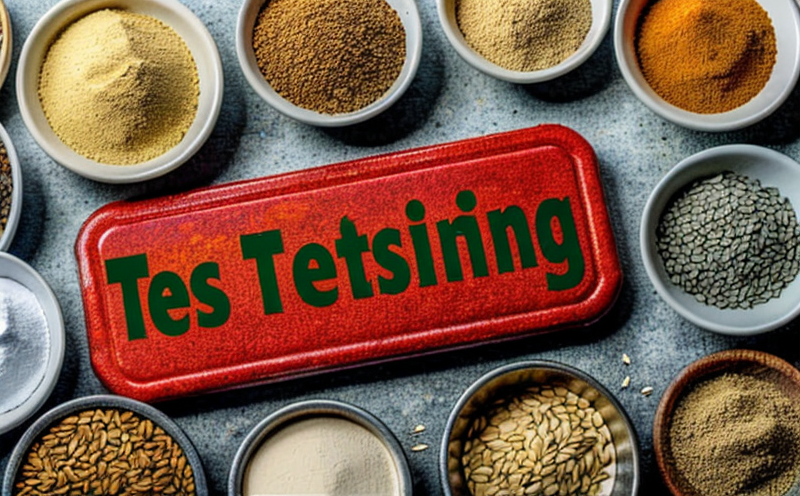Role of allergen testing in food labeling requirements
The Role of Allergen Testing in Food Labeling Requirements Ensuring Consumer Safety and Business Compliance
As consumers become increasingly aware of the importance of food safety and labeling transparency, businesses must adapt to meet these evolving demands. One critical aspect of this adaptation is allergen testing, which plays a pivotal role in ensuring compliance with food labeling regulations. At Eurolab, our team of experts provides comprehensive laboratory services, including state-of-the-art allergen testing, to help businesses like yours safeguard consumer safety and maintain regulatory compliance.
What is Allergen Testing?
Allergen testing involves the analysis of food products for the presence of common allergens such as peanuts, tree nuts, milk, eggs, fish, shellfish, soybeans, wheat, and sesame seeds. This laboratory-based testing allows businesses to accurately identify potential allergens in their products, enabling them to label them accordingly.
Why is Allergen Testing Essential for Businesses?
The consequences of failing to accurately label food products with common allergens can be severe. An allergic reaction to a hidden allergen can range from mild discomfort to life-threatening anaphylaxis. Moreover, regulatory bodies such as the FDA and EUs EFSA have implemented strict guidelines for allergen labeling, making it essential for businesses to adopt allergen testing protocols.
Key Benefits of Allergen Testing
Here are some compelling reasons why your business should incorporate allergen testing into its food safety protocol
Compliance with Regulatory Requirements By accurately identifying and labeling common allergens, businesses can ensure compliance with FDA, EU, and other regulatory bodies guidelines. This reduces the risk of non-compliance fines, product recalls, and reputational damage.
Consumer Trust and Confidence Transparent labeling builds trust between consumers and businesses. Allergen testing ensures that products are labeled accurately, enabling informed purchasing decisions and fostering a loyal customer base.
Risk Management Allergen testing helps minimize the risk of allergic reactions by identifying potential allergens. This proactive approach reduces liability and protects your business from costly lawsuits.
Improved Product Quality By detecting potential allergens early on, businesses can implement corrective measures to improve product quality and avoid contamination issues.
Competitive Advantage Companies that prioritize consumer safety through allergen testing demonstrate a commitment to excellence, setting them apart from competitors who may not adhere to the same standards.
How Does Allergen Testing Work?
Our team at Eurolab employs advanced laboratory techniques, including
ELISA (Enzyme-Linked Immunosorbent Assay) This rapid and accurate method detects allergenic proteins in food products.
PCR (Polymerase Chain Reaction) Analysis A highly sensitive technique for identifying specific DNA sequences associated with common allergens.
LC-MS/MS (Liquid Chromatography-Tandem Mass Spectrometry) A cutting-edge approach for detecting and quantifying allergenic proteins.
QA Frequently Asked Questions About Allergen Testing
Q1 What are the most common allergens I should test for?
A1 The top 8 allergens recognized by regulatory bodies include peanuts, tree nuts, milk, eggs, fish, shellfish, soybeans, and wheat. Sesame seeds have also been added to this list in recent years.
Q2 Can I perform allergen testing in-house or do I need to outsource?
A2 While some basic allergen screening can be conducted in-house, advanced testing requires specialized equipment and expertise. Outsourcing to a reputable laboratory like Eurolab ensures accuracy and compliance with regulatory guidelines.
Q3 How often should I conduct allergen testing for my products?
A3 Regular testing schedules depend on factors such as product formulation changes, supplier updates, or new regulations. Its essential to establish an ongoing testing program tailored to your business needs.
Conclusion
The role of allergen testing in food labeling requirements cannot be overstated. By incorporating this laboratory service into their protocol, businesses like yours can ensure compliance with regulatory guidelines, build consumer trust and confidence, minimize risk, and maintain a competitive edge. At Eurolab, our team is committed to providing cutting-edge allergen testing solutions that safeguard consumer safety and protect your business reputation.
Get Started Today
Dont wait contact us at Eurolab to discuss how our laboratory services can support your food safety and labeling compliance initiatives. By partnering with a trusted expert like Eurolab, youll be well on your way to ensuring the safety of your products and protecting the health of your customers.




